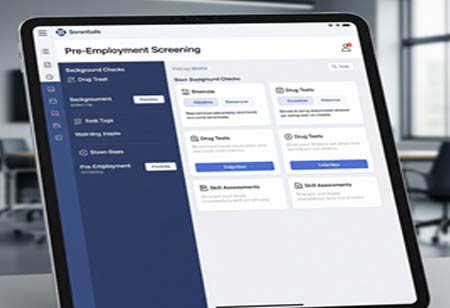THANK YOU FOR SUBSCRIBING
Be first to read the latest tech news, Industry Leader's Insights, and CIO interviews of medium and large enterprises exclusively from Hrtech Outlook
THANK YOU FOR SUBSCRIBING

By
HR Tech Outlook | Thursday, August 07, 2025
Stay ahead of the industry with exclusive feature stories on the top companies, expert insights and the latest news delivered straight to your inbox. Subscribe today.
Global competition is intensifying, and talent has become essential for business success, making hiring the right employees more critical than ever. Pre-employment screening has emerged as a strategic tool for businesses to mitigate risks, enhance workforce integrity, and ensure compliance with regulatory standards. This process typically involves a thorough background check, including verifying an applicant's identity, education, previous employment history, criminal records, and social media activity. By conducting these checks, organizations can make informed hiring decisions, reduce employee turnover, prevent workplace fraud, and maintain a safe and productive environment.
Organizations today face increased pressure to ensure that every new hire is skilled, competent, trustworthy, culturally aligned, and legally compliant. With growing concerns over cybersecurity, insider threats, and data privacy, companies increasingly invest in pre-employment screening solutions to protect their assets, reputation, and employee morale. Bias in background screening has been a point of criticism in automated systems that may inadvertently reflect systemic inequalities. Employers are trained to interpret screening results with context and judgment, avoiding automatic rejections based on outdated or irrelevant information.
Technology Implementation and Market Trends
Several compelling factors are driving the adoption and evolution of pre-employment screening services. Employers cannot afford to hire individuals with questionable backgrounds, especially when the wrong hire could compromise sensitive company data, expose the company to lawsuits, or put coworkers at risk. As remote work becomes increasingly common, employers have fewer physical interactions with candidates before hiring, making thorough screening even more critical to reduce fraud or misrepresentation. Organizations must comply with local, national, and industry-specific regulations regarding background checks, identity verification, and fair hiring practices.
Technology has transformed pre-employment screening into a streamlined, faster, and more accurate process. Digital platforms now automate the collection and verification of candidate data across global databases. AI and ML enable predictive screening by analyzing historical hiring data and identifying behavioral red flags that may indicate potential issues. Biometric authentication and facial recognition technologies are being utilized to prevent identity theft and fraud. API integrations with government registries, educational institutions, and financial databases enable real-time background checks, drastically reducing turnaround time.
The shift to mobile-friendly platforms that allow candidates to submit their documents and consent online. It enhances user experience and speeds up hiring timelines. Another trend is the growing use of social media background checks, where public online behavior is assessed to evaluate a candidate’s alignment with company values and ethical conduct. Global screening capabilities are becoming increasingly important as companies expand internationally and hire across borders. Multilingual interfaces, region-specific compliance features, and international criminal database integrations are now standard in leading screening platforms.
Applications Across Industries and Practical Solutions
Pre-employment screening services are widely utilized across various sectors, including finance, healthcare, technology, education, logistics, manufacturing, and government. Background checks verify licensing, criminal records, and credit scores to protect customer trust and prevent fraud. Healthcare organizations use these services to ensure staff meet regulatory requirements, have clean criminal records, and hold valid licenses. Educational institutions conduct background checks on faculty and staff to maintain student safety.
Transport and logistics firms verify driving records and drug testing histories to ensure public safety and compliance with regulations. Criminal records are not digitized or are protected under strict privacy laws, making it difficult to perform accurate checks. Providers are establishing global compliance networks integrating local partnerships with digital capabilities to access reliable information within legal boundaries. Manual verification processes, delays in third-party reporting, or incomplete candidate disclosures can slow the screening process. AI-driven systems can also prioritize higher-risk cases for immediate attention, enabling faster decision-making.
Growing Demand and Future Outlook
The impact of pre-employment screening on business operations is profound. It minimizes hiring risks by ensuring every employee has a verified background, reducing the chances of fraud, violence, or policy violations. It directly contributes to a safer, more stable workplace, enhancing employee morale and productivity. From a reputational standpoint, organizations that invest in robust screening are seen as more trustworthy by clients, investors, and regulatory bodies. The demand for screening services is expanding rapidly, especially in the post-pandemic world where remote hiring, gig work, and global talent pools have become the norm.
Organizations now need screening solutions that can verify identities remotely, assess digital footprints, and check international records, all while maintaining compliance with regional laws. The gig economy, in particular, has introduced a need for continuous background monitoring, where temporary or freelance workers are re-screened at intervals to ensure ongoing compliance and effective risk management. Pre-employment screening will evolve from a checkpoint to a strategic layer of workforce intelligence. Advanced analytics will help identify red flags and potential high performers based on past behavior, work history, and social indicators.
Blockchain technology could transform the industry by enabling secure, verifiable credential sharing, eliminating the need for redundant checks. AI-powered behavioral assessments will provide deeper insights into personality, motivation, and ethical disposition, aligning hiring decisions with organizational values. Transparency, candidate empowerment, and responsible data usage will shape the industry’s reputation. Despite facing data access, privacy concerns, turnaround time, and bias challenges, the industry is responding with technological innovation, ethical frameworks, and global scalability.



